五年级英语上册Unit4第四单元知识梳理
- 格式:ppt
- 大小:2.73 MB
- 文档页数:7
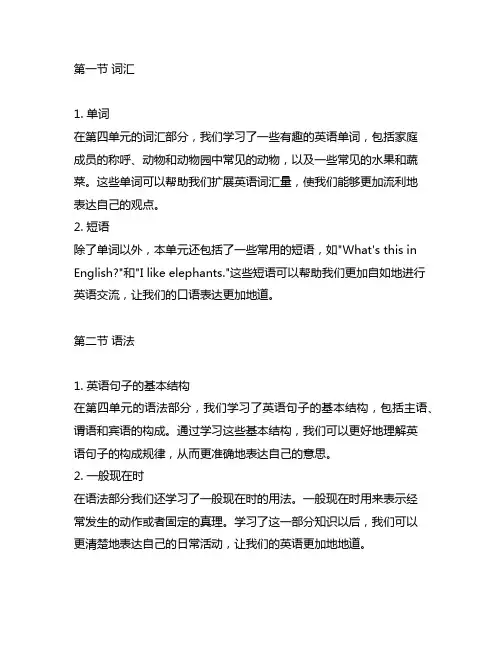
1. 单词在第四单元的词汇部分,我们学习了一些有趣的英语单词,包括家庭成员的称呼、动物和动物园中常见的动物,以及一些常见的水果和蔬菜。
这些单词可以帮助我们扩展英语词汇量,使我们能够更加流利地表达自己的观点。
2. 短语除了单词以外,本单元还包括了一些常用的短语,如"What's this in English?"和"I like elephants."这些短语可以帮助我们更加自如地进行英语交流,让我们的口语表达更加地道。
第二节语法1. 英语句子的基本结构在第四单元的语法部分,我们学习了英语句子的基本结构,包括主语、谓语和宾语的构成。
通过学习这些基本结构,我们可以更好地理解英语句子的构成规律,从而更准确地表达自己的意思。
2. 一般现在时在语法部分我们还学习了一般现在时的用法。
一般现在时用来表示经常发生的动作或者固定的真理。
学习了这一部分知识以后,我们可以更清楚地表达自己的日常活动,让我们的英语更加地地道。
在第四单元的阅读部分,我们学习了有关动物园的一些内容。
通过阅读,我们不仅可以了解动物园中常见的动物,还可以开阔我们的视野,了解更多有趣的知识。
阅读是扩展知识的重要方式,而且有助于提高我们的语言表达能力。
第四节写作1. 描写动物在写作部分,我们学习了如何描写动物。
我们可以通过描述动物的外貌、生活习性等方面来展现出我们对动物的了解。
这不仅可以锻炼我们的语言表达能力,还可以培养我们的观察力和想象力。
2. 描述自己的家庭在写作部分,我们还学习了如何描述自己的家庭。
我们可以通过描述家庭成员的外貌、性格等方面来展现出我们对家庭的认识。
这有助于我们更好地表达自己的感情,同时也有助于提高我们的写作能力。
第五节口语1. 关于动物的问答在口语部分,我们学习了有关动物的问答。
学习了这些内容以后,我们可以更自如地进行关于动物的对话,让我们的口语表达更加地道。
2. 介绍自己的家庭在口语部分,我们还学习了如何介绍自己的家庭。
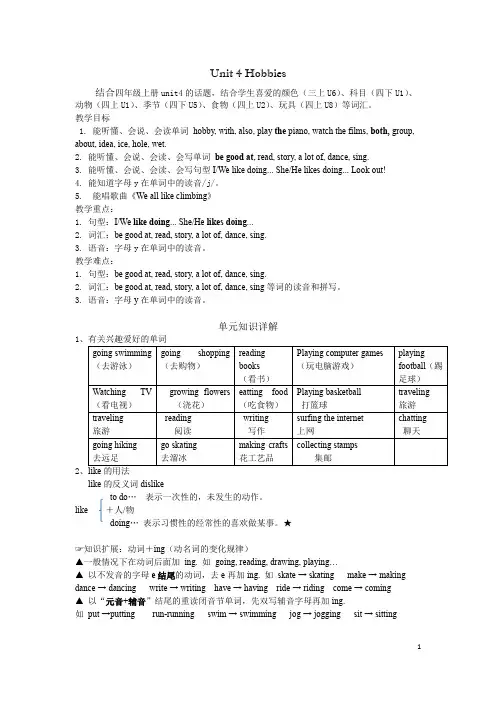
Unit 4 Hobbies结合四年级上册unit4的话题,结合学生喜爱的颜色(三上U6)、科目(四下U1)、动物(四上U1)、季节(四下U5)、食物(四上U2)、玩具(四上U8)等词汇。
教学目标1. 能听懂、会说、会读单词hobby, with, also, play the piano, watch the films, both, group, about, idea, ice, hole, wet.2. 能听懂、会说、会读、会写单词be good at, read, story, a lot of, dance, sing.3. 能听懂、会说、会读、会写句型I/We like doing... She/He likes doing... Look out!4. 能知道字母y在单词中的读音/j/。
5. 能唱歌曲《We all like climbing》教学重点:1. 句型:I/We like doing... She/He likes doing...2. 词汇:be good at, read, story, a lot of, dance, sing.3. 语音:字母y在单词中的读音。
教学难点:1. 句型:be good at, read, story, a lot of, dance, sing.2. 词汇:be good at, read, story, a lot of, dance, sing等词的读音和拼写。
3. 语音:字母y在单词中的读音。
单元知识详解12、like的用法like的反义词disliketo do…表示一次性的,未发生的动作。
like +人/物doing…表示习惯性的经常性的喜欢做某事。
★☞知识扩展:动词+ing(动名词的变化规律)▲一般情况下在动词后面加ing. 如going, reading, drawing, playing…▲以不发音的字母e结尾的动词,去e再加ing. 如skate → skating make → making dance → dancing write → writing have → having ride → riding come → coming▲以“元音+辅音”结尾的重读闭音节单词,先双写辅音字母再加ing.如put →putting run-running swim → swimming jog → jogging sit → sitting(1)like doing sth句式变化:①肯定句:主语+ like(s) + doing +… 当主语是第三人称单数时,like后面要加s,如:I like singing. They like dancing. He likes playing basketball. She likes skating.②否定句:主语+ don’t/ doesn’t + like + doing + ….,如:I don’t like singing. They don’t like dancing.He doesn’t like playing basketball. She doesn’t like skating.③一般疑问句:Do/ Does + 主语+ like + doing + …? 如:Do you like sing? Do they like dancing?Does he like playing basketball? Does she like skating?④特殊疑问句:疑问词+ do/ does + 主语+ like + doing + …? 如:What do you like? What do they like doing? What does he/she like (doing)?句型练习:My name is Si Qian. I have a lot of hobbies. I like _________(draw) and ________(play) the piano. I like _________(fish) and __________(shop), too. But I don’t like _________(listen) to music or _________(dance). I have a good friend. Her name is Petch(佩奇). She ________ (like) ________ (play) basketball and _________(have) a picnic. She __________(not like) __________(paint) or ___________(run).例句:【2018无锡市统考五年级下】He likes playing football.词句考点:①人称代词②动词的三单形式③like的用法【2018无锡市统考五年级下】The girl on the shoes,but it fit her.A tries;isn’tB try;isn’tC tries;doesn’t3、be good at (擅长,在……方面做得好)的用法+名词Iam not good at football.be good at +代词He is good at it.+动名词(ing)Iam not good at playing football.☞知识拓展①be good for +动词原形。
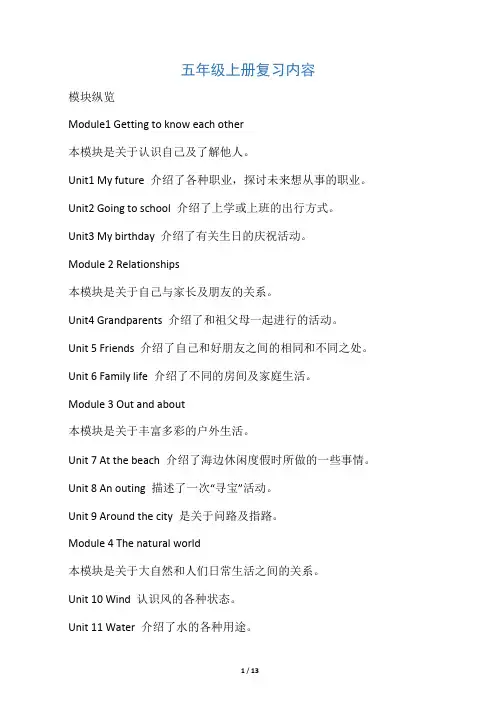
五年级上册复习内容模块纵览Module1 Getting to know each other本模块是关于认识自己及了解他人。
Unit1 My future 介绍了各种职业,探讨未来想从事的职业。
Unit2 Going to school 介绍了上学或上班的出行方式。
Unit3 My birthday 介绍了有关生日的庆祝活动。
Module 2 Relationships本模块是关于自己与家长及朋友的关系。
Unit4 Grandparents 介绍了和祖父母一起进行的活动。
Unit 5 Friends 介绍了自己和好朋友之间的相同和不同之处。
Unit 6 Family life 介绍了不同的房间及家庭生活。
Module 3 Out and about本模块是关于丰富多彩的户外生活。
Unit 7 At the beach 介绍了海边休闲度假时所做的一些事情。
Unit 8 An outing 描述了一次“寻宝”活动。
Unit 9 Around the city 是关于问路及指路。
Module 4 The natural world本模块是关于大自然和人们日常生活之间的关系。
Unit 10 Wind 认识风的各种状态。
Unit 11 Water 介绍了水的各种用途。
Unit 12 Fire 介绍了一些基本的防火知识。
第一单元复习词组Jump into the lake fly a plane cook nice food(be)afraid of flying help people drive a taxi(be)good at...句型用What do you want to be ?询问对方将来想从事的职业。
用I want to be ...及I want to (do)...介绍自己未来想从事的职业及理由。
难点1)当句子主语为第三人称单数时,动词要做适当的变化。
2)want to do 与want to be 的正确用法。
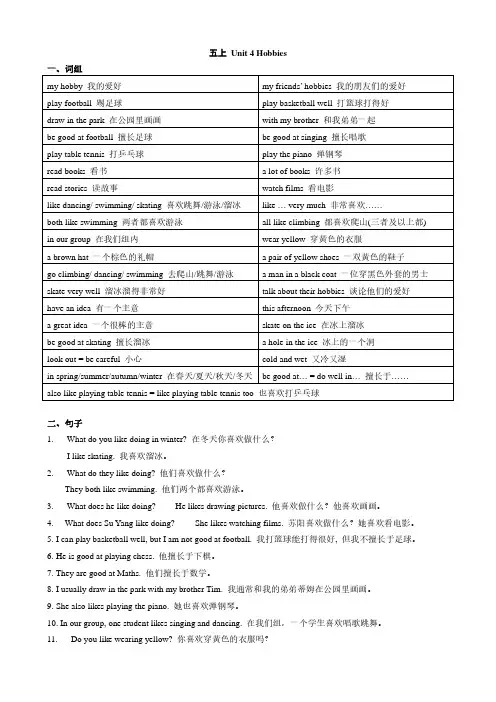
五上Unit 4 Hobbies一、词组二、句子1.---What do you like doing in winter?在冬天你喜欢做什么?---I like skating.我喜欢溜冰。
2.---What do they like doing?他们喜欢做什么?---They both like swimming.他们两个都喜欢游泳。
3.---What does he like doing?---He likes drawing pictures.他喜欢做什么?他喜欢画画。
4.---What does Su Yang like doing?----She likes watching films.苏阳喜欢做什么?她喜欢看电影。
5. I can play basketball well, but I am not good at football.我打篮球能打得很好,但我不擅长于足球。
6. He is good at playing chess.他擅长于下棋。
7. They are good at Maths.他们擅长于数学。
8. I usually draw in the park with my brother Tim.我通常和我的弟弟蒂姆在公园里画画。
9. She also likes playing the piano.她也喜欢弹钢琴。
10. In our group, one student likes singing and dancing.在我们组,一个学生喜欢唱歌跳舞。
11.---Do you like wearing yellow?你喜欢穿黄色的衣服吗?---Yes, I do./No, I don’t.12. Mary doesn’t like wearing pink.玛丽不喜欢穿粉色的衣服。
13. We all like climbing very much.我们都非常喜欢爬山。
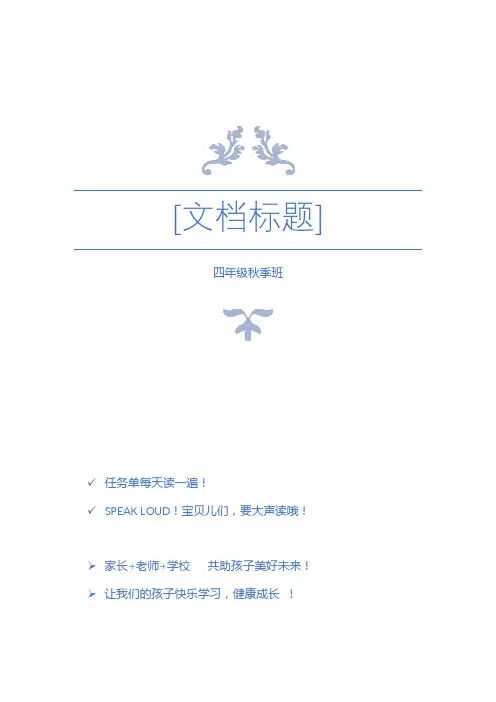
[文档标题]四年级秋季班✓任务单每天读一遍!✓SPEAK LOUD!宝贝儿们,要大声读哦!➢家长+老师+学校共助孩子美好未来!➢让我们的孩子快乐学习,健康成长!人教版Unit4 What can you do?1.swim 游泳【动词ing形式】swimming 【短语】go swimming 去游泳【例句】I often swim in summer .我经常在夏天游泳。
2.speak English 说英语【联想】speak Chinese 说汉语【例句】We sometimes speak English after class .我们有时在课后说英语。
3.play basketball 打篮球【联想】play football 踢足球【例句】We can play basketball . 我们会打篮球。
4.pingpong 乒乓球【短语】play pingpong打乒乓球【例句】She is a good pingpong player .她是一名优秀的乒乓球运动员。
5.sing (动词)唱,唱歌song (名词)歌曲【短语】sing English songs唱英文歌曲【例句】I can sing English songs. 我会唱英文歌。
6. kung fu 功夫,武术【短语】do kung fu练武术【例句】He can do some kung fu. 他会练武术。
7.draw 画【短语】draw cartoons 画漫画draw pictures 画画【例句】She can draw cartoons. 她会画漫画。
8. many许多【例句】There are many students in the classroom.在教室里有许多学生。
9.problem 问题【短语】no problem没问题10.wonderful 极好的,了不起的【短语】a wonderful time 一段美好的时光11. send 邮寄,发送.email电子邮件【短语】send an email 发邮件12.next 下一个的,紧接着的【短语】next weekend 下周末【例句】We will have an English party next weekend.下周末我们将举行一个英语派对。
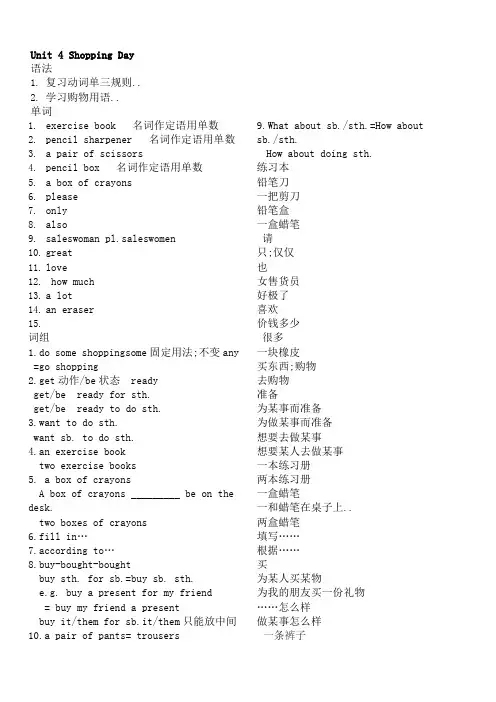
Unit 4 Shopping Day 语法1.复习动词单三规则..2.学习购物用语..单词1.exercise book 名词作定语用单数2.pencil sharpener 名词作定语用单数3. a pair of scissors4.pencil box 名词作定语用单数5. a box of crayons6.please7.only8.also9.saleswoman pl.saleswomen10.great11.love12. how much13.a lot14.an eraser15.词组1.do some shoppingsome固定用法;不变any =go shopping2.get动作/be状态 readyget/be ready for sth.get/be ready to do sth.3.want to do sth.want sb. to do sth.4.an exercise booktwo exercise books5. a box of crayonsA box of crayons _________ be on the desk.two boxes of crayons6.fill in…7.according to…8.buy-bought-boughtbuy sth. for sb.=buy sb. sth.e.g. buy a present for my friend= buy my friend a presentbuy it/them for sb.it/them只能放中间9.What about sb./sth.=How about sb./sth.How about doing sth.练习本铅笔刀一把剪刀铅笔盒一盒蜡笔请只;仅仅也女售货员好极了喜欢价钱多少很多一块橡皮买东西;购物去购物准备为某事而准备为做某事而准备想要去做某事想要某人去做某事一本练习册两本练习册一盒蜡笔一和蜡笔在桌子上..两盒蜡笔填写……根据……买为某人买某物为我的朋友买一份礼物……怎么样做某事怎么样10.a pair of pants= trousers 一条裤子/shoes/boots/scissors/chopsticks/glas ses/gloves/socks/earringsA pair of shoes is thereTwo pairs of shoes are there由此可见:1.可用a pair of修饰的名次均为复数名词.2.谓语动词的单复数由pair量词决定.. 11.look greatlook/smell/taste/sound/feel+adj.五大感官动词是半系动词12.write down the total price13.thank sb. for doing sth.I thank them for loving me.14.shopping online15.stay at home16.an easy way to buy things17.in your home in one’s homeat home18.look for…19.search for…20.the things thatyou wang to buy21.need sth. to do sth. 实义动词need sth.实义动词need sb. to do sth. .实义动词need to do sth. .实义动词need do sth. .情态动词22.ask sb. notto do sth.tell sb. not to do sth.23.wait at homewait for…24.a few days later25.a grade 5 student=a student in Grade Five26.a pet shop27.next to…28.after school29.like…very much30.give sb.sth.=give sth.to sb.31.three more dollars数字+more+名词复数32.on sale33.the next day34.to one’s surprise e.g. to his surprise一双鞋/一双靴子/一副剪刀/一双筷子/一副眼镜/一副手套/一副袜子/一副耳环一双鞋在那边..两双鞋在那边..看上去挺好看起来/闻起来/尝起来/听起来/摸起来+形容词写下总价为某事而感谢某人我感谢他们爱我..网上购物呆在家一种买东西的简单方式在你的家在某人的家;此处home是名词在家;此处home是副词寻找……动作搜寻……你想要买的东西需要某物去做某事需要某物需要某人去做某事需要去做某事需要做某事要求某人不要去做某事告诉某人不要去做某事等在家等待……几天以后一个五年级的学生一个宠物店挨着……放学后非常喜欢……给某人某物再来三美元在原来基础上再来多少……出售第二天令某人惊讶吃惊的是……重点句型1.Can I help you 我能帮您吗 =What can I do for you2.Yes; please. I want to buy a present for my friend.是的;我想为我的朋友买一个礼物..3.What about=How about a model car这个车模行不行 How much is it=what’sthe price of it=How much does it cost它要多少钱4.It’s 30 yuan.它要30元..5.I’ll take it. 我买了..6.How much are the pants 这条裤子多少钱7.They are 80 yuan. 它要80 元.. I’ll take them.我买了..8.How much is it all together 它们一共多少钱9.It’s 25 yuan.一共要25元..10.Thanks a lot.=Thank you very much.11.How much do you think they are=How much are they; do you think你认为它们多少钱特殊疑问词+ do you think+陈述句 =特殊疑问句;+do you thinke.g.你认为莉莉在哪里__________________________=________________________作文范例My name is Linda. I like shopping. My schoolbag is 100 yuan. I like it very much. My friend is Lily. She likes shopping; too. Her schoolbag is 120 yuan. She doesn’t like it. She wants to buy a new one.。
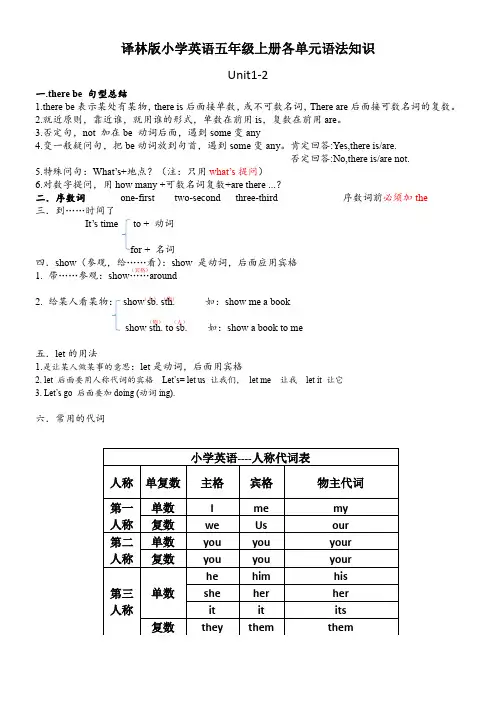
(宾格) (人) (物) (物) (人) 译林版小学英语五年级上册各单元语法知识Unit1-2一.there be 句型总结1.there be 表示某处有某物,there is 后面接单数,或不可数名词,There are 后面接可数名词的复数。
2.就近原则,靠近谁,就用谁的形式,单数在前用is ,复数在前用are 。
3.否定句,not 加在be 动词后面,遇到some 变any4.变一般疑问句,把be 动词放到句首,遇到some 变any 。
肯定回答:Yes,there is/are.否定回答:No,there is/are not.5.特殊问句:What’s+地点?(注:只用what’s 提问)6.对数字提问,用how many +可数名词复数+are there ...?二.序数词 one -first two -second three -third 序数词前必须加the三.到……时间了It’s time to + 动词for + 名词四.show (参观,给……看):show 是动词,后面应用宾格1. 带……参观:show ……around2. 给某人看某物: show sb. sth. 如:show me a bookshow sth. to sb. 如:show a book to me五.let 的用法1.是让某人做某事的意思:let 是动词,后面用宾格2. let 后面要用人称代词的宾格 Let’s= let us 让我们, let me 让我 let it 让它3. Let’s go 后面要加doing (动词ing).六.常用的代词Unit3-4一.have ,has 的用法1.当主语是第三人称单数时,用has,包括he ,she,it.人的名字,单个的人或物体2.当主语是第一、二人称(I/you/we/they,)以及复数时,用have3.否定句:在动词have前加don’t 主语+ don’t + have +.........+ 动词用原形(have)has前加doesn’t 主语+ doesn’t + have+ ........3.一般疑问句,在句首加Do+ 主语+ have(动词原形)……?Does❖如句子中有和“我有关的”第一人称人称需改成和“你”有关的第二人称人称。
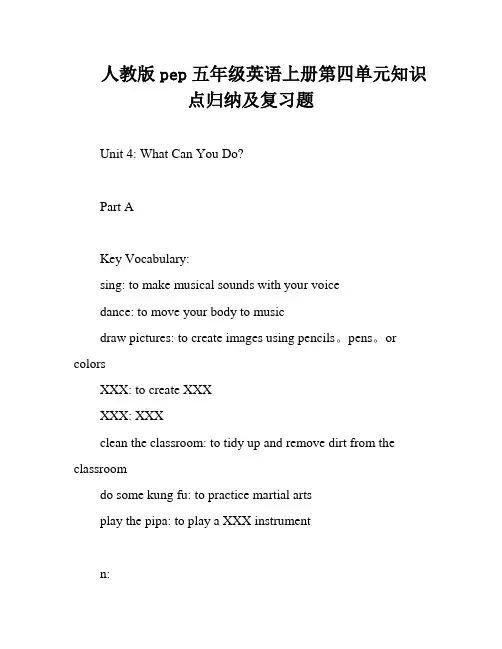
人教版pep五年级英语上册第四单元知识点归纳及复习题Unit 4: What Can You Do?Part AKey Vocabulary:sing: to make musical sounds with your voicedance: to move your body to musicdraw pictures: to create images using pencils。
pens。
or colorsXXX: to create XXXXXX: XXXclean the classroom: to tidy up and remove dirt from the classroomdo some kung fu: to practice martial artsplay the pipa: to play a XXX instrumentn:Miss White: "We'll have an English party next Tuesday。
What can you do for the party。
children?"Zhang Peng: "I can XXX."Miss XXX: "Wonderful。
How about you。
John?"XXX: "I can do some kung fu!"Miss White: "Thank you。
John."XXX:1."We'll" is a n of "we will," which indicates a XXX n。
"Will" is an auxiliary XXX。
The structure is "will + base verb + other words."XXX: "I will have an English class."2."Can" XXX。
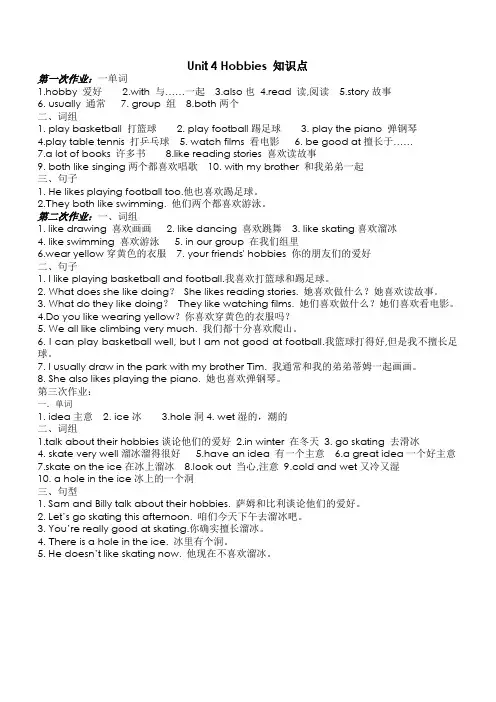
Uni t 4 Hobbies 知识点第一次作业:一单词1.hobby 爱好2.wi t h 与……一起3.also也4.read 读,阅读5.s t ory故事6. usually 通常7. group 组8.bo t h两个二、词组1. play baske t ball 打篮球2. play foo t ball踢足球3. play t he piano 弹钢琴4.play t able t ennis 打乒乓球5. wa t ch films 看电影6. be good a t擅长于……7.a lo t of books 许多书8.like reading s t ories 喜欢读故事9. bo t h like singing两个都喜欢唱歌10. wi t h my bro t her 和我弟弟一起三、句子1. He likes playing foo t ball t oo.他也喜欢踢足球。
2.T hey bo t h like swimming. 他们两个都喜欢游泳。
第二次作业:一、词组1. like drawing 喜欢画画2. like dancing 喜欢跳舞3. like ska t ing喜欢溜冰4. like swimming 喜欢游泳5. in our group 在我们组里6.wear yellow穿黄色的衣服7. your friends' hobbies 你的朋友们的爱好二、句子1. I like playing baske t ball and foo t ball.我喜欢打篮球和踢足球。
2. Wha t does she like doing?She likes reading s t ories. 她喜欢做什么?她喜欢读故事。
3. Wha t do t hey like doing?T hey like wa t ching films. 她们喜欢做什么?她们喜欢看电影。
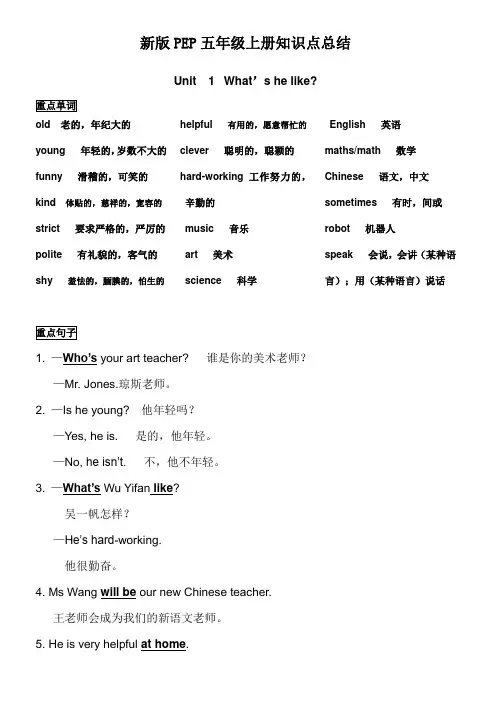
新版PEP五年级上册知识点总结Unit 1 What’s he like?old 老的,年纪大的young 年轻的,岁数不大的funny 滑稽的,可笑的kind 体贴的,慈祥的,宽容的strict 要求严格的,严厉的polite 有礼貌的,客气的shy 羞怯的,腼腆的,怕生的helpful 有用的,愿意帮忙的clever 聪明的,聪颖的hard-working 工作努力的,辛勤的music 音乐art 美术science 科学English 英语maths/math 数学Chinese 语文,中文sometimes 有时,间或robot 机器人speak 会说,会讲(某种语言);用(某种语言)说话1. —Who’s your art teacher? 谁是你的美术老师?—Mr. Jones.琼斯老师。
2. —Is he young? 他年轻吗?—Yes, he is. 是的,他年轻。
—No, he isn’t.不,他不年轻。
3. —What’s Wu Yifan like?吴一帆怎样?—He’s hard-working.他很勤奋。
4. Ms Wang will be our new Chinese teacher.王老师会成为我们的新语文老师。
5. He is very helpful at home.他在家很能干。
6. Robin is short but strong.罗宾个子矮,但是身体强壮。
7. He can speak Chinese and English.他会说中文和英语。
8. He 他让我写作业。
字母y在单词中的发音:1、双音节或多音节词末发[ i ]。
例:baby happy windy sunny sorry candy many family party 婴儿开心的有风的晴朗的对不起糖果许多家庭聚会课外补充:2、y在单音节词末发[ ai ]例:b y 乘坐m y 我的wh y 为什么cr y 哭fl y 飞1、询问他人的外貌或性格:-What’s he/she like?- He/She is kind/…2、一般疑问句的问与答:—Is he/she…?—Yes, he/she is.—No, he/she isn’t.—Do you know…?—Yes, I do.—No, I don’t3、be 动词的三种形式am, is, are 与人称代词连用的用法:I + am,He, she, it ,人名、物名+ is We, you, they + are4、Ms., Miss, Mr., Mrs.的区别:Ms. [miz](缩略词)(用于女子的姓氏或姓名前,不指明婚否)女士; Miss [mis](用于未婚女子的姓氏或姓名前,以示礼貌)小姐,女士; Mr. [mist ](mister 的缩略词)(用于男子的姓氏或姓名前)先生; Mrs. [misiz](用于已婚女子的姓氏或姓名前)太太;夫人。
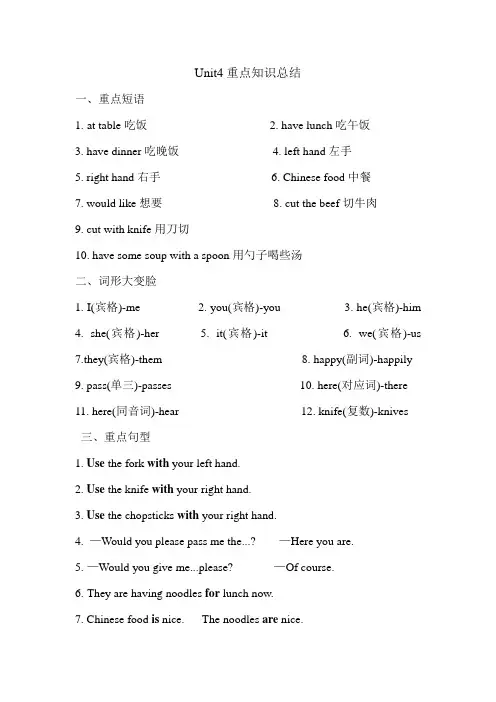
Unit4重点知识总结一、重点短语1.at table吃饭2. have lunch吃午饭3. have dinner吃晚饭4. left hand左手5. right hand右手6. Chinese food中餐7. would like想要8. cut the beef切牛肉9. cut with knife用刀切10. have some soup with a spoon用勺子喝些汤二、词形大变脸1. I(宾格)-me2. you(宾格)-you3. he(宾格)-him4. she(宾格)-her5. it(宾格)-it6. we(宾格)-us7.they(宾格)-them8. happy(副词)-happily9. pass(单三)-passes 10. here(对应词)-there11. here(同音词)-hear 12. knife(复数)-knives三、重点句型1. Use the fork with your left hand.2. Use the knife with your right hand.3. Use the chopsticks with your right hand.4. —Would you please pass me the...? —Here you are.5.—Would you give me...please? —Of course.6.They are having noodles for lunch now.7. Chinese food is nice. The noodles are nice.8. I like Chinese food. But I can’t use chopsticks well.9. I want to have some soup.10. Here are the chopsticks.11. You can’t use your knife and fork,can you?12. Not like that. Do it like this.13. We have rice for dinner.14. In China,we often use chopsticks.15. They are having dinner happily.16. —Where do you often have lunch?—I often have lunch at school.☆where哪里,提问“地点”;you来问,I来答四、句型转换1.I can use the fork. (改为否定句)☆思路:can+not 答案:I can’t use the fork.2.They have rice for dinner. (改为现在进行时态)☆思路:be+doing 答案:They are having rice for dinner.3.Would you please give me an eraser? (做肯定回答)Sure. / Here you are.4.Give they some books,please. (改错)Give them some books,please.。
【人教版】五年级英语上册第四单元知识点归纳及复习题Unit4 What can you do?Part A一、重点单词sing唱,唱歌dance跳舞draw pictures 画画draw cartoons 画漫画sing English songs 唱英文歌曲I can sing an English songclean the classroom 打扫教室do some kung fu 练武术(kung fu,音译词,功夫;erhu,tofu,pipa)play the pipa 弹琵琶二、课文导入Miss white:【1】We’ll have an English party next Tuesday!What can you do for the party,children?Zhang Peng:I 【2】can sing English songs.Miss white:【3】Wonderful! 【4】How about you, John?John: I can do some kung fu!Miss white:Thank you, John.1、we’ll = we will,will表示“将要”的意思,在这句话中充当助动词,修饰句子的时态,表达一种将来的意思,will+动词原形+其他I will have an English class 我将会有一节英语课She will go to the KFC to eat her favorite hamburger她将会去kfc吃她最喜欢的汉堡包2、can,情态动词,表示“可以”的意思,即具有做某事的能力,can+动词原形+其他You can sing English song 你会唱英文歌She can play the pipa 她会弹琵琶注意:will和can 都没有人称和数的变化【拓展】只要句子里面有can、will等词语,那么将句子改为疑问句,都是将can、will提到主语前面即可——Will you have an English class?——Will she go to the KFC to eat her favorite Hamburger?——Can I sing English song?——Can she play the pipa?练一练:(1). I will play football with my friend on Saturday____________________________________(2). She will draw some pictures for her mother as birthday gift____________________________________(3). Mike can do kung fu________________(4). She can sing many Chinese songs__________________________3、赞美用语wonderful!Wonderful 的意思为“好极了!太棒了!”它常用在口语中,用来表达赞美之情—Mom,I can sing and dance—Wonderful!4、how about you?你呢?How about you = what about you?它们的意思都是“你呢?”“......怎么样?”,常常用于引出话题后,询问别人的情况怎样。
人教版五年级英语上册《Unit4 What can you do?》重点难点知识梳理重点:询问某人能做什么的问句及答语;询问某人是否会做某事的问句及答语。
难点:字母组合oo的发音规则;祈使句的否定形式。
【重点词组】sing English songs 唱英文歌曲play the pipa 弹琵do kung fu 练武术draw cartoons 画漫画play basketball 打篮球play ping-pong 打乒乓球speak English 说英语no problem 没问题【惯用表达式】1. Wonderful! 好极了!2. No problem. 没问题。
3. Cool! 太酷了4. Try me! 试试我吧【重点句子与句型】1.询问某人能做什么的问句及答语问句:What can+主语+do(+其他)?答语:主语+can+动词(短语)原形(+其他)课文例句:- What can you do for the party, children? 孩子们,你们能为联欢会做什么?-I can sing English songs.我会唱英文歌曲。
2.询问某人是否会做某事的问句及答语Can+主语+动词(短语)原形(+其他)?Yes,主语+can./主语+can't课文例句:- Can you do any kung fu,John?你会练武术吗,约翰?Yes,I can. 是的,我会。
【了解句型】1. We'll have an English party next Tuesday下星期二我们将要举办一场英语联欢会!解读:这是一个一般将来时的句子,表示即将发生的事情。
2. I can play ping-pong, but I can't swim.我会打乒乓球,但是我不会游泳。
解读: 这是表达某人会做某事,但不会做另一件事的句子。
can't= cannot,意为"不能, 不会”。
五年级英语(上册)各单元知识梳理Unit 1知识梳理【单词】1. bear 熊2. forest 森林3. there (与be连用)有4. house 房子5. soup 汤6. room 房间7. hard 硬的8. soft 软的9. afraid 害怕的10. her 她(宾格)11. Help! 救命啊!12. beside 在...旁边13. between 在...中间14. under 在...下面15. behind 在....后面16. really 真的17. then 然后18. find 找到,发现19. their 他们的;她们的;它们的【词组】1.in the forest 在森林里2. a beautiful house 一栋漂亮的房子3. in the house 在房子里4. hungry and thirsty 又饿又渴5. too cold 太冷6. too hot 太热7. just right 正好,刚好8. on the table 在桌子上9. in the room 在房间里10. too hard 太硬11. too soft 太软12. be afraid 害怕的13. three bears 三只熊14. in front of her 在她面前15. on the chair 在椅子上16. a glass of milk 一杯牛奶17. have a cold 感冒18. put on your coats 穿上你(们)的外套19. in Western countries 在西方国家20. in China 在中国21. have some cakes 吃些蛋糕22. in the kitchen 在厨房里23. in the fridge 在冰箱里24.find their cousin 找到他们的外甥25. in the living room 在客厅26. some toy cars 一些玩具车27. three umbrellas 三把雨伞28. in the glass 在杯子里29. in the tree 在树上30. in the box 在盒子里【句子】1.There is a house. 有一栋房子。
5A Unit4 Hobbies知识汇总一、单词:
二、词组
四、语音:
字母y 的发音:
1)如果字母y 在单词的最前面,那y 发/j/(苏州话“叶”的发音)
e.g.:you 你;your 你的;yours 你的;youth 少年;year 年;yellow黄色的;
yes 是的;young 年轻的;
2)还可以发[aɪ]:fly, by, cry, my, bye, goodbye, buy, butterfly, July …
3)还可以发/I/: family, slowly, hungry copy, happy, lovely, pretty, sorry, twenty …
五、语法知识点:
like + V-ing (动名词形式)
动词原形---动名词形式:
1)一般情况下,直接加-ing形式:draw—drawing; read—reading; sing-singing
2) 以默音e结尾的,去e加-ing形式:dance-dancing; write ---writing ; make--- making ;
ride---riding; take---taking; like---liking; hope—hoping; have—having
3) 重读闭音节(只有一个元音字母+一个辅音字母结尾时)要双写结尾的辅音字母再加-ing
如:sit--sitting ; swim—swimming; put--putting ; run—running; shop—shopping; jog---jogging;
forget—forgetting; get—getting; stop—stopping; begin—beginning。
以下是一份五年级上册第四单元英语课堂笔记,供您参考:Unit 4 What can you do?Part A1. 新单词:can 能够;会;可以;可以,可能;也许。
动词原形can,变否定句not 加前缀;变成疑问句,can提前到句首。
2. 句型:What can you do? 你会做什么?I can sing/dance/jump/draw. 我能唱歌/跳舞/跳跃/画画。
3. 单词记忆:dance(跳舞);jump(跳跃);draw(画画);write(写字);swim(游泳);fly a kite(放风筝);play the pipa(弹琵琶);play basketball(打篮球)。
4. 语法点:情态动词“can”表示能力,用法与第一单元相似。
疑问句和否定句的变化规则也相同。
Part B1. 新单词:see 看到,见到;明白,了解;看到;参观。
动词原形see,变否定句not 加前缀;变成疑问句,can提前到句首。
2. 句型:What can you do for the party? 你能为聚会做什么?I cansing/dance/jump/draw for the party. 我能为聚会唱歌/跳舞/跳跃/画画。
3. 单词记忆:sing for the party(为聚会唱歌);dance for the party (为聚会跳舞);jump for the party(为聚会跳跃);draw for the party (为聚会画画)。
4. 语法点:现在进行时表示正在进行的动作或存在的状态。
结构为“be动词+动词ing”,常用的时间状语有“now”、“at this time”、“right now”等。
希望这份笔记能够帮助您更好地学习五年级上册第四单元的英语课程。
译林英语五年级上册第四单元知识汇总5上Unit 4 Hobbies 知识汇总一、词汇。
(四会单词必须会默写)四会单词:1.read 读2.story 故事3.dance 跳舞4.sing 唱歌5.hobby 爱好6.with 与…一起三会单词:1.also 也2.both 都(二者)3.all 都(三者或以上)4.group 组5.about 关于6.idea 主意7.ice 冰8.hole 洞9.wet 湿的二、词组(四会词组必须会默写)四会词组:1.play the piano 弹钢琴2.watch films 看电影3.be good at singing 擅长唱歌4.a lot of books许多书5. my hobby 我的爱好6. our hobbies 我们的爱好7.play football 踢足球8.like dancing 喜欢跳舞9.look out = be careful 小心10. read stories 读故事三会词组:1.with my brother 和我弟弟一起2.draw in the park 在公园画画3. cold and wet 又冷又湿4.your friends’ hobbies你朋友们的爱好5.play basketball well 打篮球打的好6. play table tennis 打乒乓球7.yellow shoes 黄色的鞋子8.a yellow hat 一只黄色的帽子9.talk about their hobbies 谈论他们的爱好10.this afternoon 今天下午11.go skating 去溜冰12.skate on the ice 在冰上溜冰13.a hole in the ice 冰里有个洞14.have an idea 有一个主意15.a great idea 一个好主意16.like climbing 喜欢攀爬17. skate very well 滑冰滑得很好18. like swimming 喜欢游泳19. in spring/summer/autumn/winter 在春天、夏天、秋天、冬天三、句型。